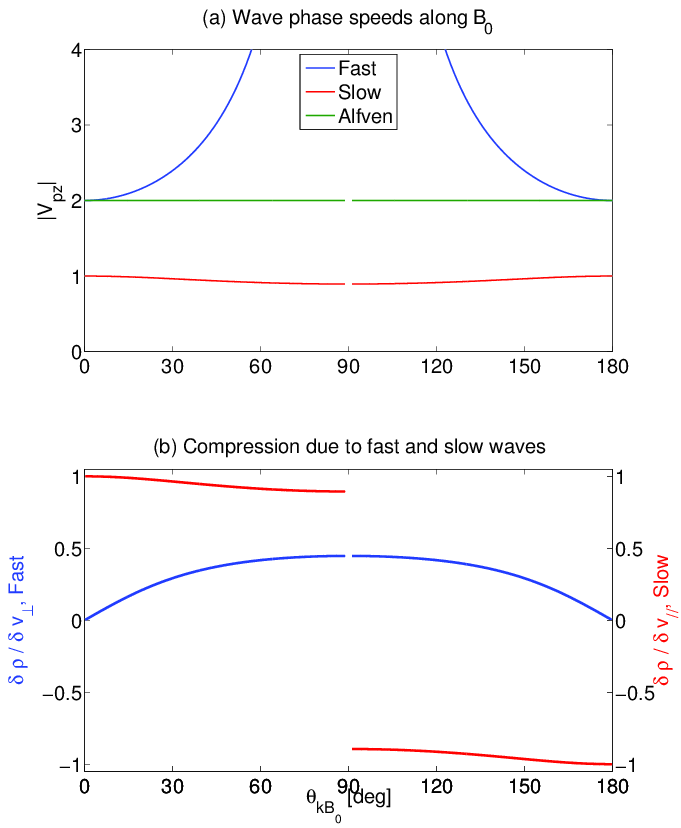Ann. Geophys., 33, 13-23, 2015 www.ann-geophys.net/33/13/2015/ doi:10.5194/angeo-33-13-2015
Identification of slow magnetosonic wave trains and their evolution in 3-D compressible turbulence simulation
L. Zhang1, L.-P. Yang1,2, J.-S. He1, C.-Y. Tu1, L.-H. Wang1, E. Marsch3, and X.-S. Feng21School of Earth and Space Sciences, Peking University, 100871 Beijing, China 2SIGMA Weather Group, State Key Laboratory for Space Weather, Center for Space Science and Applied Research, Chinese Academy of Sciences, Beijing, China 3Institute for Experimental and Applied Physics, Christian-Albrechts-Universität zu Kiel, Kiel, Germany
Abstract.  In solar wind, dissipation of slow-mode magnetosonic waves may play a significant role in heating the solar wind, and these modes contribute essentially to the solar wind compressible turbulence. Most previous identifications of slow waves utilized the characteristic negative correlation between δ|B | and δρ. However, that criterion does not well identify quasi-parallel slow waves, for which δ|B | is negligible compared to δρ. Here we present a new method of identification, which will be used in 3-D compressible simulation. It is based on two criteria: (1) that V pB 0(phase speed projected along B 0) is around ± c s, and that (2) there exists a clear correlation of δv || and δρ. Our research demonstrates that if v A > c s, slow waves possess correlation between δv || and δρ, with δρ / δv ||≈ ± ρ0 / c s. This method helps us to distinguish slow-mode waves from fast and Alfvén waves, both of which do not have this polarity relation. The criteria are insensitive to the propagation angle θk B , defined as the angle between wave vector k and B 0; they can be applied with a wide range of β if only v A > c s. In our numerical simulation, we have identified four cases of slow wave trains with this method. The slow wave trains seem to deform, probably caused by interaction with other waves; as a result, fast or Alfvén waves may be produced during the interaction and seem to propagate bidirectionally away. Our identification and analysis of the wave trains provide useful methods for investigations of compressible turbulence in the solar wind or in similar environments, and will thus deepen understandings of slow waves in the turbulence.
In solar wind, dissipation of slow-mode magnetosonic waves may play a significant role in heating the solar wind, and these modes contribute essentially to the solar wind compressible turbulence. Most previous identifications of slow waves utilized the characteristic negative correlation between δ|B | and δρ. However, that criterion does not well identify quasi-parallel slow waves, for which δ|B | is negligible compared to δρ. Here we present a new method of identification, which will be used in 3-D compressible simulation. It is based on two criteria: (1) that V pB 0(phase speed projected along B 0) is around ± c s, and that (2) there exists a clear correlation of δv || and δρ. Our research demonstrates that if v A > c s, slow waves possess correlation between δv || and δρ, with δρ / δv ||≈ ± ρ0 / c s. This method helps us to distinguish slow-mode waves from fast and Alfvén waves, both of which do not have this polarity relation. The criteria are insensitive to the propagation angle θk B , defined as the angle between wave vector k and B 0; they can be applied with a wide range of β if only v A > c s. In our numerical simulation, we have identified four cases of slow wave trains with this method. The slow wave trains seem to deform, probably caused by interaction with other waves; as a result, fast or Alfvén waves may be produced during the interaction and seem to propagate bidirectionally away. Our identification and analysis of the wave trains provide useful methods for investigations of compressible turbulence in the solar wind or in similar environments, and will thus deepen understandings of slow waves in the turbulence.
This work is supported by NSFC grants under contracts 41231069, 41174148, 41222032, 41274172, 41031066, and 41304133.
Citation: Zhang, L., Yang, L.-P., He, J.-S., Tu, C.-Y., Wang, L.-H., Marsch, E., and Feng, X.-S.: Identification of slow magnetosonic wave trains and their evolution in 3-D compressible turbulence simulation, Ann. Geophys., 33, 13-23, doi:10.5194/angeo-33-13-2015, 2015.
